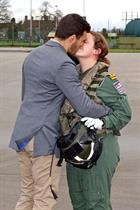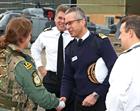Last deployed Lynx in the Royal Navy flies home!
Flight 208, the last deployed Royal Navy Lynx Flight returns home to take its place in the history books following the successful completion of a 9 month operational deployment embarked in HMS Portland.
Flight Commander Lieutenant (Lt) Laura Cambrook lands back home at 815 Naval Air Squadron, Royal Naval Air Station (RNAS) Yeovilton having deployed on 20 June 2017 on HMS Portland.
As Lynx goes out of service on 31 March 2017 this Lynx marks a significant moment in history after 41 years of operational service. Commander (Cdr) Phil Richardson the Commanding Officer of 815 NAS welcomed 208 Flight back into the fold amongst their family members, friends and colleagues.
Cdr Richardson said, “We are delighted to welcome back 208 Flight who have been embarked in HMS Portland for the last nine months. They have operated in every environment, from the oppressive mid-summer heat of the Arabian Gulf to the harsh conditions of the South Atlantic.
It’s really great to be back after a very demanding but exhilarating deployment where we achieved 190 hours of flight.
Lieutenant Laura Cambrook, Lynx Flight Commander
Cdr Richardson continued, “They have conducted lifesaving missions at extreme range, fired sea skua missiles for their continuation training and have delivered a most impressive level of aircraft serviceability of an aging yet hugely successful airframe. We welcome them home after a very successful deployment.
“They are the last Lynx deployed after a very successful history of Lynx helicopters being embarked and integrated within the Royal Navy’s Frigates and Destroyers. Their success and experience will be transferred across to the Wildcat as 815 completes its transition to this new aircraft type. Welcome home 208 Flight – last of the Lynx”.
Since deploying last year they have travelled over 40,000 miles through the North Atlantic, Mediterranean Sea, and Indian Pacific and South Atlantic Oceans.
Flight 208 have worked tirelessly to maintain operational capability and defensive readiness, in some of the most high threat waters in the world, delivering counter narcotics patrols and helping to maintain un-interrupted flow of global trade where the worlds merchant traffic passes.
Lt Laura Cambrook said, “It’s really great to be back after a very demanding but exhilarating deployment where we achieved 190 hours of flight. It’s been a very successful deployment and poignant too and I will miss the Lynx, she rattles a lot, is small and agile; it’s just a great little helicopter that so many of us love to fly.
"The Wildcat is going to take over that mantle really well in a much, much more capable aircraft”.








